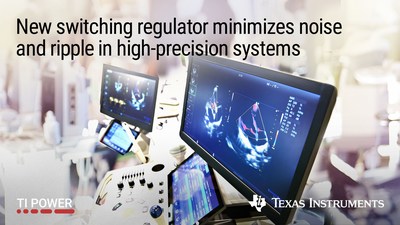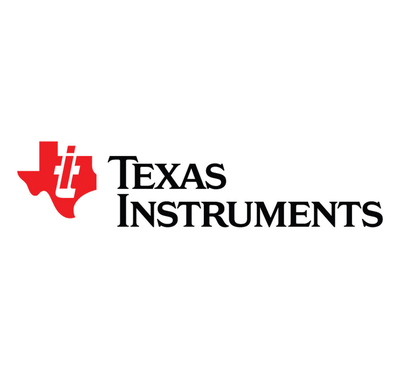Engineers can achieve high-efficiency operation for noise-sensitive applications with TI's low-noise, low-ripple buck converters
DALLAS, Oct. 21, 2020 — (PRNewswire) — Texas Instruments (TI) (Nasdaq: TXN) today introduced a new family of low-noise DC/DC switching regulators with integrated ferrite-bead compensation. The TPS62912 and TPS62913 offer low noise of 20 µVRMS for frequencies ranging from 100 Hz to 100 kHz and ultra-low output-voltage ripple of 10 µVRMS, giving engineers the ability to remove one or more low-dropout regulators (LDOs) from their designs, reduce power losses by up to 76% and save 36% of board space. For more information, see www.ti.com/TPS62912-pr and www.ti.com/TPS62913-pr.Noise in the power supply is a key design challenge in many high-precision test and measurement, medical, aerospace and defense, and wireless infrastructure applications. A traditional low-noise power-supply architecture includes a DC/DC converter; a low-noise LDO such as the TPS7A52, TPS7A53 or TPS7A54; and an off-chip filter, such as a ferrite bead. By integrating ferrite-bead compensation, the TPS62912 and TPS62913 use the ferrite bead already present in most systems as an effective filter against high-frequency noise, reducing the power supply output voltage ripple by approximately 30 dB and simplifying the power supply design. To learn how low-noise buck converters work, read the technical article, " Minimize noise and ripple with a low-noise buck converter."
TI will demonstrate the TPS62913 in its virtual booth at the electronica virtual conference, Nov. 9-12, 2020. For more information, go to https://www.ti.com/about-ti/trade-shows/electronica.html.
Easily minimize power-supply noise
High-precision systems require supply rails with low noise and low ripple to preserve signal accuracy and integrity. The TPS62912 and TPS62913 offer both, along with a power-supply rejection ratio of 65 dB at up to 100 kHz. In addition, this buck converter family has an output-voltage error of less than 1%, which helps ensure tight output-voltage accuracy. Both converters enable the use of spread-spectrum frequency modulation to further attenuate radio-frequency spurs and allow synchronization to an external clock so engineers can easily meet their signal-to-noise ratio (SNR) and spurious-free dynamic range (SFDR) targets, which are critical in applications such as medical imaging or radar.
Maximize efficiency while reducing power loss
Historically, engineers have faced a trade-off between noise and efficiency when powering sensitive analog circuitry. Using a switching regulator on its own would result in too much switching noise, while adding a post-regulator LDO to reduce noise would lead to additional power losses, especially at high load currents. With a peak efficiency of 97%, the TPS62912 and TPS62913 allow engineers to design for noise filtering without an LDO, reducing power losses by up to 76% – 1.8 W in analog front-end (AFE) designs and 1.5 W in designs using a wideband analog-to-digital converter (ADC), such as the ADC12DJ5200RF. This represents a 20% and 15% increase in efficiency, respectively, when compared to a traditional low-noise power architecture. Read the application note, " Powering Noise-Sensitive ADCs with the TPS62913 Low-Ripple and Low-Noise Buck Converter," to learn more.
Save board space and overall system cost
By using the TPS62912 or TPS62913 in their designs, engineers can eliminate not only the linear regulator but also the associated passive components, which can save approximately 20 mm2 of printed circuit board (PCB) area per LDO. Designs that typically use a single LDO can save 36% of PCB space. In addition, the integrated ferrite-bead compensation of the buck converters helps engineers reduce the overall DC/DC component count, eliminating two capacitors and two resistors from their designs, to further minimize overall system cost and shorten design time.
Availability and pricing
Pre-production quantities of the 2-A TPS62912 and 3-A TPS62913 are available now, only on TI.com, in a 2-mm-by-2-mm, 10-pin quad flat no-lead (QFN) package. Pricing starts at US$1.06 and US$1.16 respectively, in 1,000-unit quantities. The TPS62912EVM and TPS62913EVM evaluation modules are available on TI.com for US$49. Multiple payment and shipping options are available on TI.com. TI expects both devices to be available in volume production in the first quarter of 2021.
About Texas Instruments
Texas Instruments Incorporated (Nasdaq: TXN) is a global semiconductor company that designs, manufactures, tests and sells analog and embedded processing chips for markets such as industrial, automotive, personal electronics, communications equipment and enterprise systems. Our passion to create a better world by making electronics more affordable through semiconductors is alive today, as each generation of innovation builds upon the last to make our technology smaller, more efficient, more reliable and more affordable – making it possible for semiconductors to go into electronics everywhere. We think of this as Engineering Progress. It's what we do and have been doing for decades. Learn more at TI.com.
Trademarks
All registered trademarks and other trademarks belong to their respective owners.
![]() View original content to download multimedia:
http://www.prnewswire.com/news-releases/industrys-first-low-noise-buck-converters-with-integrated-ferrite-bead-compensation-simplify-high-precision-designs-301156750.html
View original content to download multimedia:
http://www.prnewswire.com/news-releases/industrys-first-low-noise-buck-converters-with-integrated-ferrite-bead-compensation-simplify-high-precision-designs-301156750.html
SOURCE Texas Instruments
| Contact: |
| Company Name: Texas Instruments
Shaina Rabhan, Golin, 469-865-4001 Email Contact Olga Malone, Texas Instruments, 214-479-8851 Email Contact (Please do not publish these numbers or email addresses.) Web: http://www.ti.com Financial data for Texas Instruments |


